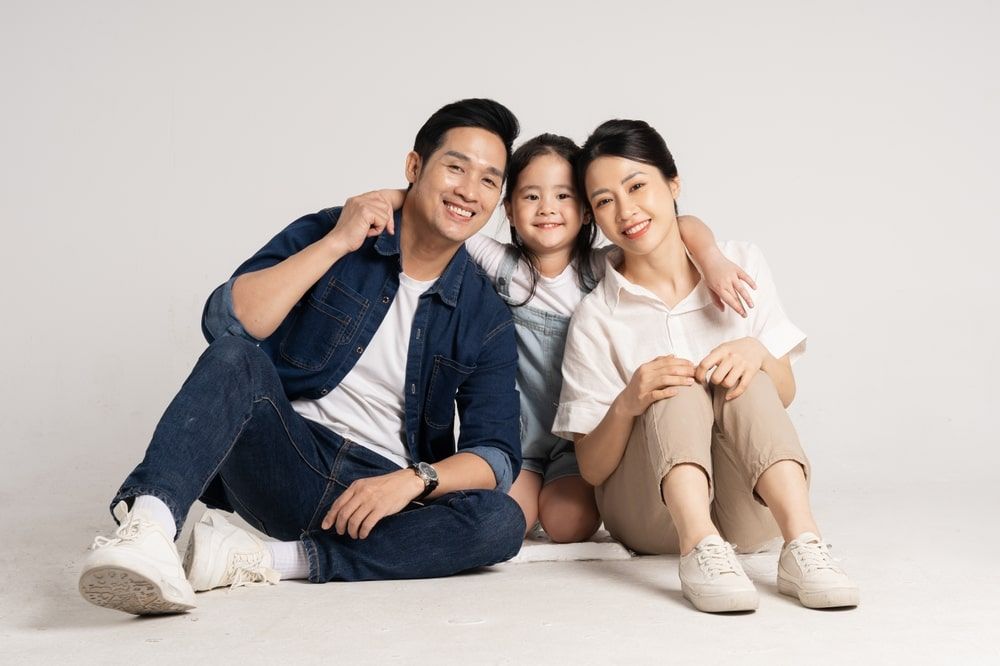Confronting Generational Trauma in Asian Households
There’s a topic that resonates deeply with many of us: the unspoken specter of generational trauma within Asian households. It’s an intricate issue, often veiled by the intricacies of culture and history, yet it wields a profound influence on our lives, seeping into our very identities and shaping our experiences. In this blog, we’ll navigate the intricate web of healing generational trauma, unraveling what it truly means, how it stealthily creeps into our lives, why it’s essential to confront, and, most importantly, the initial steps to embark on the path of healing.
What is Generational Trauma?
Generational trauma, sometimes referred to as ancestral or intergenerational trauma, is a profound concept that goes beyond the scope of a single traumatic incident. It’s like an invisible thread weaving through the tapestry of a family’s history, carrying the emotional, psychological, and sometimes even physical scars of past generations.
Imagine it as an emotional inheritance. The pain, suffering, and unresolved issues of our ancestors become part of our psychological baggage. These issues aren’t always apparent or easily traceable, but they exert a significant influence on our thoughts, feelings, and behaviors.
How Does Generational Trauma Transpire?
Historical Events:
The historical tapestry of many Asian families is woven with threads of tumultuous events. Wars, colonization, forced migrations, political instability, and cultural revolutions have left a lasting imprint. These are not mere isolated incidents but enduring chapters in a family’s narrative. The trauma inflicted by these events transcends generations, becoming an indelible part of the family’s collective memory.
Imagine, for a moment, the profound impact of surviving a war, witnessing the forced displacement of loved ones, or enduring persecution. These experiences imprint themselves deeply on the family’s emotional DNA. The scars they leave shape not only how individuals view the world but also how they respond to adversity. It’s a resilience born out of necessity, a survival strategy passed down through generations.
For example, a family’s reaction to adversity might be an amalgamation of resourcefulness, stoicism, and an unyielding spirit, all nurtured by the historical hardships their ancestors endured.
Cultural Influences:
Cultural factors are a significant lens through which generational trauma is perceived and perpetuated. Asian cultures are rich and diverse, each with its unique values that influence family dynamics and the way trauma is handled.
- Saving Face: “Saving face” is a cultural norm with profound implications in many Asian cultures. It’s the unspoken commitment to preserving honor and dignity, both on an individual level and for the family as a whole. This powerful value can lead individuals to suppress their pain and keep silent about their experiences. Acknowledging trauma may be perceived as a loss of face, a vulnerability that goes against the grain of this deeply ingrained cultural norm.
- Not Burdening Others: The belief in not burdening others with one’s problems is a noble and self-sacrificial approach that often results in people suffering in silence. There’s a genuine fear that sharing one’s pain might inconvenience or upset their loved ones. It’s a selfless act driven by a sense of duty to protect others from the weight of their own suffering.
- Maintaining Harmony: The importance of maintaining harmony within the family is another significant cultural influence. It’s a commitment to peace, unity, and the avoidance of conflict. This emphasis can create an environment where difficult conversations or airing grievances are actively avoided to keep the peace. Even if it means perpetuating generational trauma, the priority remains on the preservation of family harmony.
The ‘Silence’ Syndrome:
The ‘Silence’ Syndrome is the collective hushing of pain, suffering, and trauma deeply rooted in Asian households. It’s a coping mechanism that, while well-intentioned, ultimately becomes counterproductive. It serves as a protective shield, preserving a semblance of normalcy, upholding the cultural norm of saving face, and maintaining family harmony.
In this environment of silence, generational trauma festers and remains unaddressed, sometimes for generations. Family members may carry their individual wounds in solitude, unaware that they are part of a larger pattern that stretches back through their family’s history.
Recognizing the roots of this silence is the essential first step in breaking the cycle. It’s about understanding that the silence, which has been a means of protection, can also be a barrier to healing.
Why is Healing Generational Trauma Important?
Generational trauma, like a silent yet powerful undercurrent, transcends the pages of history to shape our present and mold our future. The significance of addressing this profound issue resonates on multiple levels:
Fortifying Mental and Emotional Well-being:
Unresolved trauma is not merely a ghost of the past; it’s a formidable presence that haunts our daily lives. It sows the seeds of anxiety, depression, and a myriad of other mental struggles. Healing generational trauma acts as a beacon of hope, illuminating the path towards emotional equilibrium, serenity, and a profound sense of well-being. It’s the journey to free ourselves from the emotional shackles that have long constrained our growth and happiness.
The Mind-Body Connection:
The intricate bond between mind and body is undeniable. The relentless stress and emotional turmoil stemming from generational trauma can manifest in the form of chronic health issues, including hypertension, heart disease, and autoimmune disorders. Healing generational trauma is akin to a self-compassionate act that invigorates overall health and longevity, disentangling the pernicious link between emotional suffering and physical ailments.
Fostering Fulfilling Relationships:
Generational trauma, like an unseen hand, can disrupt our capacity to establish and nurture healthy relationships. It raises barriers that make it challenging to connect with others and place trust in the bonds we create. Healing generational trauma marks the inception of a journey aimed at constructing more profound, gratifying relationships with our partners, family members, and friends. It’s a conduit to forging authentic connections and genuine human interactions.
Unleashing Potential and Achievement:
Unresolved trauma often lurks in the corners of our potential, fostering self-doubt, imposter syndrome, and the fear of failure. It holds us back from attaining our zenith. Healing generational trauma is the key to unshackling our inner strength and resilience. It liberates us from the confining beliefs that have restrained our progress, paving the way for personal and professional success and a life brimming with fulfillment and purpose.
Legacy and Posterity:
Above all, tackling generational trauma constitutes an investment in the well-being of subsequent generations. When we embark on the journey of healing generational trauma, we curtail the propagation of trauma. We craft a legacy characterized by resilience, emotional well-being, and open communication for our progeny and their descendants. It’s a chance to rewrite the familial narrative, bequeathing a future that gleams with positivity, health, and prosperity. It’s a testament of love and empathy for the generations to follow—a gift that endures, promising a brighter, richer, and more prosperous lineage.
How to Begin Healing Generational Trauma
The path to healing generational trauma is an intricate journey, demanding a harmonious symphony of self-compassion, support-seeking, familial history exploration, shattering the silence, resilience fortification, and cultural reconnection. Let’s explore these vital steps with a bit more gusto:
Start with Self-Compassion:
At the heart of this transformative journey lies self-compassion, the compass guiding your way. It’s about acknowledging that you are not to blame for the trauma you’ve inherited. Grant yourself the grace to feel, without judgment. These are not your burdens to bear, and you should be kind to yourself. The role of elders in this process is crucial; their wisdom and experiences can provide context and validation, offering insights into generational patterns and affirming the journey of healing.Self-compassion serves as the bedrock upon which your healing journey takes shape. It’s the key to emotional liberation, a bridge from the shadows of your past to a brighter future.
Seek Support for Healing Generational Curses:
This journey should not be traversed in solitude. Reach out to therapists, support groups, or trusted friends and family. These individuals provide you with a sanctuary, free from judgment, where you can unburden your soul and share your experiences. Their presence offers the strength to navigate the intricacies of healing generational trauma and healing generational curses… Remember, seeking help is a testament to your inner fortitude, a way to share your burdens and find solace in shared experiences.
Unearth the Stories:
Understanding your family’s history is a crucial piece of the puzzle. Dive headfirst into the experiences and challenges your ancestors faced. It’s a journey that allows you to grasp their stories, which intricately weave into your feelings and behaviors. This exploration is an exercise in empathy, an opportunity to connect the dots, and a way to illuminate the roots of your trauma. Through this journey, you carve a path to profound healing and transformation.
Break the Silence of Generational Trauma Cycle:
Generational trauma thrives in the shadows of silence. Creating an environment where open and honest conversations within your family can flourish is a fundamental stride. It’s the bedrock of the healing process. Encourage every family member to feel secure when sharing their thoughts and emotions. In this nurturing sanctuary, each member can unburden themselves, support one another, and pave the way for recovery. Breaking the silence is not just a step; it’s a revolution against the generational trauma cycle.
Cultivate Resilience:
Resilience is your unyielding companion in this healing journey. It’s about building emotional strength and the ability to rise from adversity. Engaging in practices like mindfulness, yoga, or meditation becomes your arsenal against stress and anxiety. These practices furnish you with the tools to navigate your emotional labyrinth, strengthening your inner resolve and equipping you to confront the echoes of the past. Resilience is your unwavering foundation.
Cultural Connection in Healing Generational Curses:
Embracing your cultural identity and traditions serves as a reservoir of strength in your healing odyssey. Reconnecting with your cultural roots instills a deep sense of belonging and support. It reminds you that your cultural heritage isn’t a relic of the past; it’s a wellspring of resilience and healing. By embracing your cultural identity, you build a bridge between history and the present, empowering your journey with the strength of your heritage.
Ready to address the deep-rooted wounds of generational trauma in Asian households?
Discover pathways to healing with mental health support! Nurturing healing and resilience amidst generational trauma is vital for fostering healthier family dynamics within Asian communities. At Uncover Mental Health Counseling, we understand the significance of this journey and are here to provide guidance. Here’s how you can take the first steps:
- Schedule a Free Consultation: If you are in New York, start by arranging a free 15 min consultation with Uncover Mental Health Counseling to delve into the complexities of generational trauma within your Asian household.
- Connect with NYC Trauma Therapists: Our NYC therapy team comprises experienced NYC trauma specialists who are skilled at navigating cultural nuances, generational trauma, and providing compassionate support for healing.
- Implement Healing Practices: Collaborate with our generational trauma experts to develop tailored healing practices aimed at addressing generational trauma and fostering resilience within your family.





































